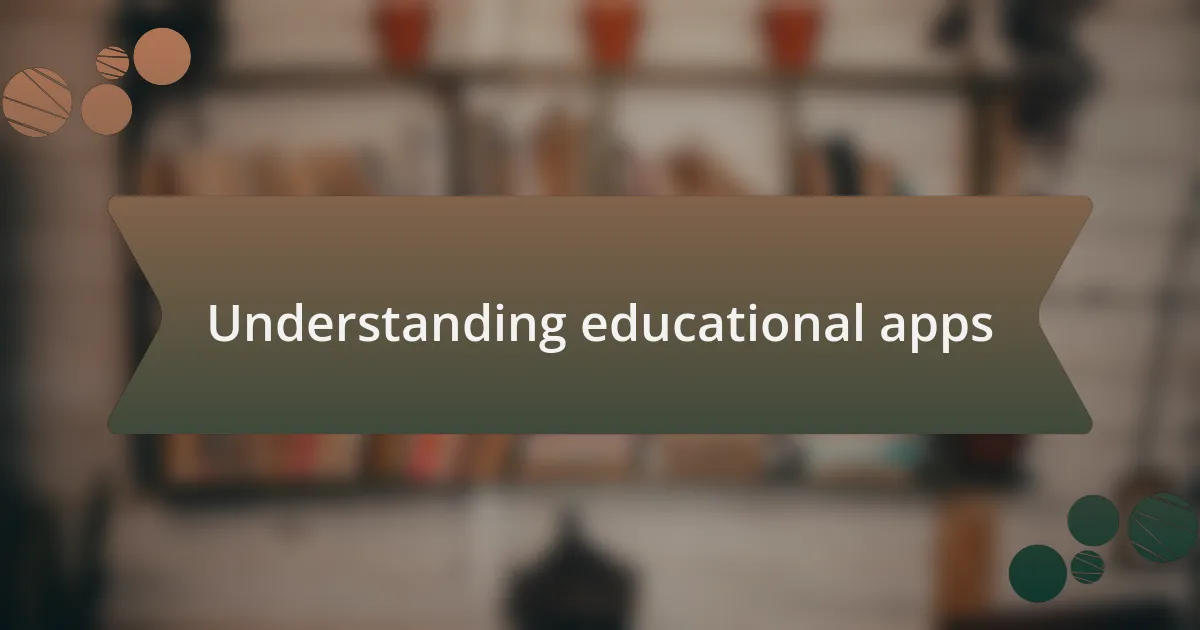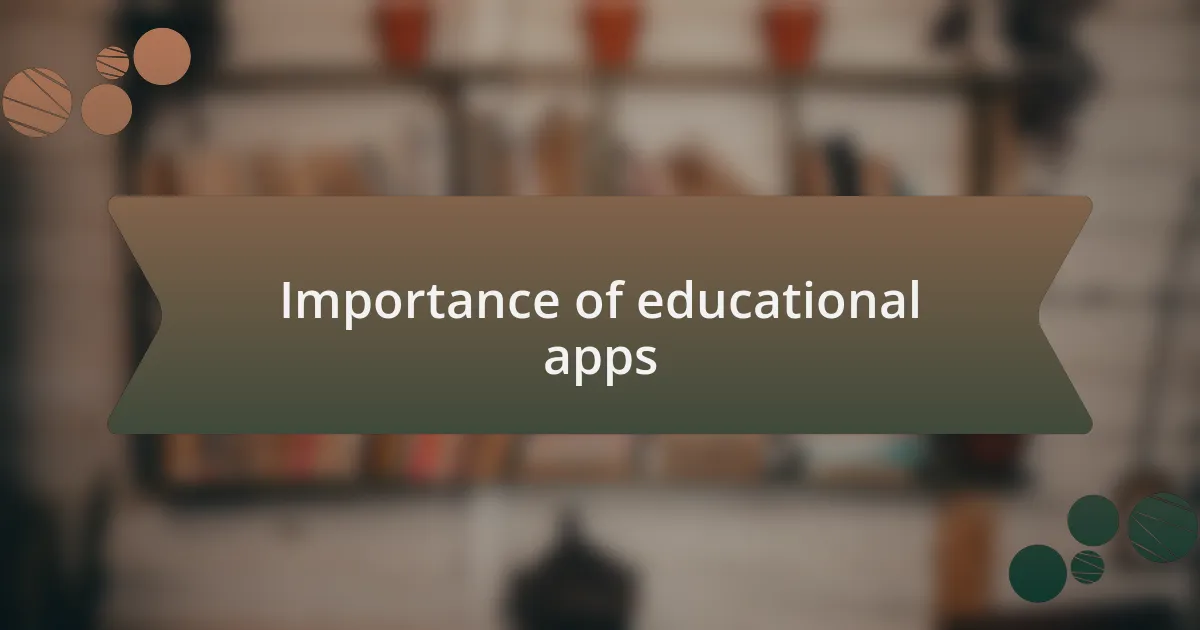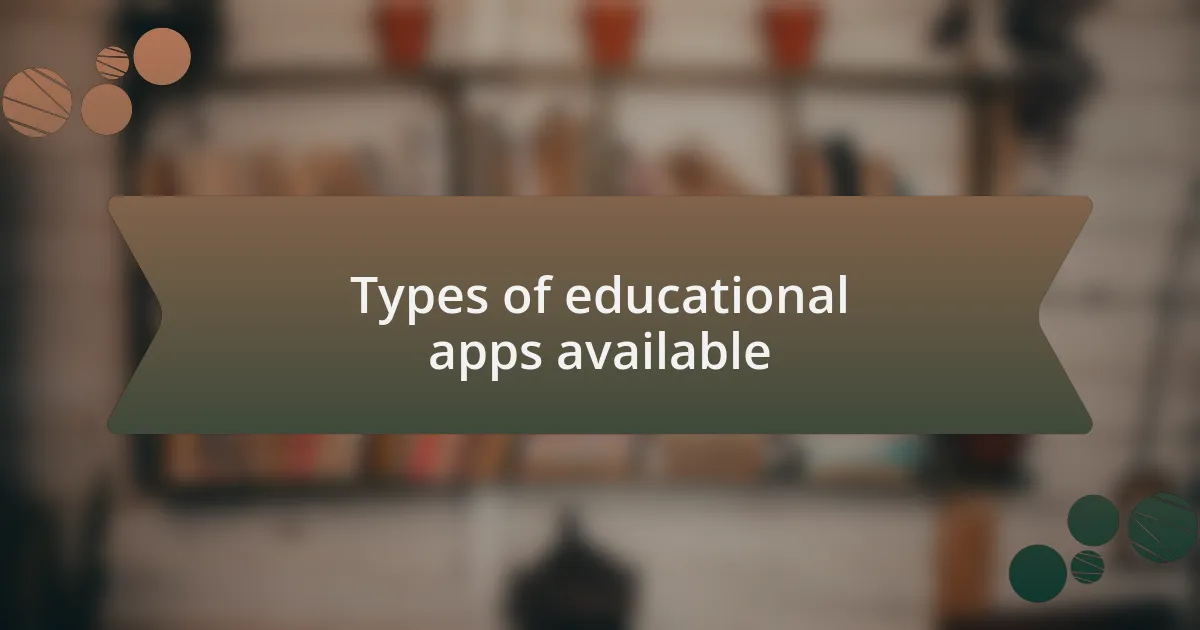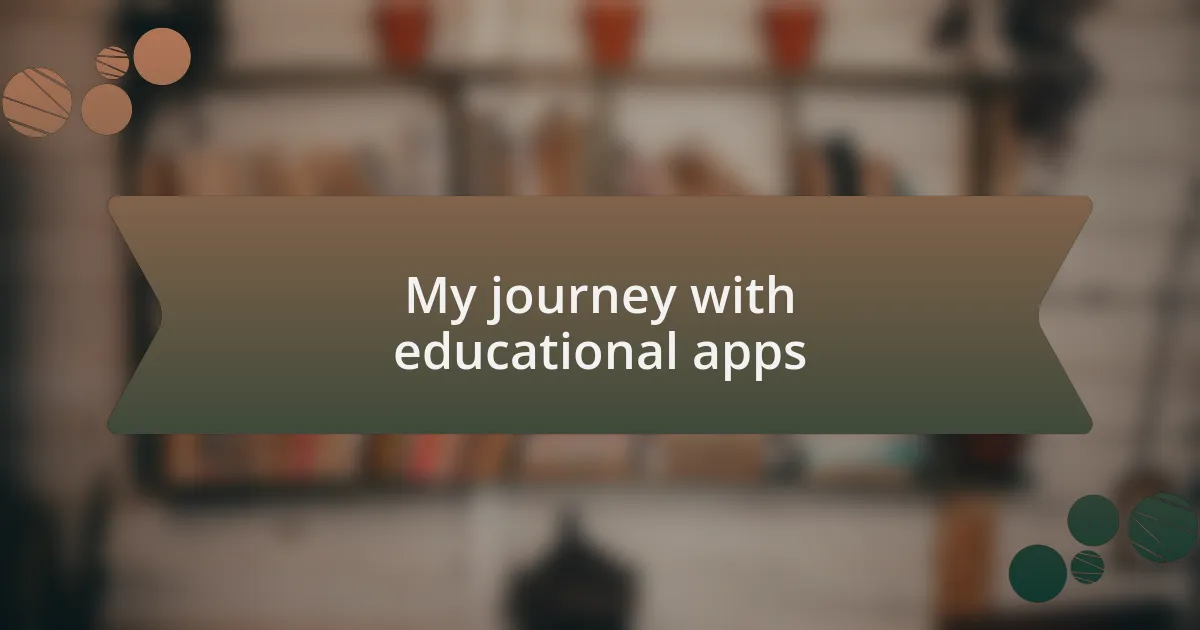Key takeaways:
- Educational apps enhance learning by catering to different styles through interactive and tailored experiences.
- They provide immediate feedback and foster independence, empowering learners to explore subjects at their own pace.
- Types of educational apps include Learning Management Systems (LMS), game-based learning, and skills development apps.
- Personalized learning experiences can help build confidence and facilitate mastery in challenging subjects.

Understanding educational apps
Educational apps have taken the learning landscape by storm, and it’s fascinating to see how they integrate technology into our daily education routines. I remember the first time I used a math app to help my child practice multiplication. The colorful interface and interactive quizzes not only made learning fun but also kept my child engaged longer than traditional methods ever could.
When I think about understanding educational apps, it’s essential to recognize their potential to cater to different learning styles. Do you remember when you struggled with a particular subject in school? Apps can provide tailored experiences, offering visual, auditory, and kinesthetic learning opportunities all in one place, which was a game-changer for me.
Another point to consider is the balance between screen time and hands-on learning. I’ve often wondered if these apps would replace traditional learning tools. In my experience, while they can enhance and supplement education, nothing can truly replace the connection of a teacher’s insight and a student’s curiosity in a classroom setting.

Importance of educational apps
Educational apps are crucial in today’s learning environment because they break down the barriers of traditional education. I recall using a language-learning app during my travels; it helped me grasp basic phrases quickly and with confidence. I often found myself thinking, how awesome is it that I could carry an entire classroom in my pocket?
Moreover, the immediacy of feedback from these apps is invaluable. I vividly remember the thrill of seeing my score improve in a science quiz app, which motivated me to dive deeper into the subject right there. Isn’t it reassuring to have instant validation? This kind of responsiveness can be a powerful motivator for learners of all ages.
Finally, educational apps can foster independence in learning, allowing users to explore subjects at their own pace. I’ve seen my niece spend hours on a coding app, driven by her curiosity to create games rather than just being a passive consumer of information. Doesn’t it feel great to empower learners to take charge of their education? It’s a fantastic shift that can lead to lifelong learning.

Types of educational apps available
When exploring the landscape of educational apps, I have found a handful of types that really stand out. Learning management systems (LMS) have been game-changers for efficient course delivery. For instance, I remember using one during an online workshop, where all resources were neatly organized, making it effortless to follow along. Isn’t it amazing how a well-structured app can enhance the learning experience?
Game-based learning apps have also played a significant role in my educational journey. I vividly recall getting wrapped up in an interactive math game, where solving equations earned me points and rewards. That sense of competition not only made learning fun, but it also spurred me on to tackle tougher problems. Who knew equations could feel like an adventure?
Lastly, there are apps specifically designed for skills development, from coding to public speaking. I once downloaded an app focused on improving my writing skills, and it allowed me to practice and receive reviews in real-time. I was thrilled each time I applied feedback and saw my writing sharpen. Can you imagine the confidence boost when you realize you’re actually improving?

My journey with educational apps
As I ventured into the world of educational apps, my initial excitement quickly turned into a thrilling exploration. I remember my first experience with a language-learning app; the joy of mastering basic phrases in Spanish was intoxicating. Each daily practice session felt like unlocking a new door, and I often found myself eagerly anticipating those moments of discovery. Have you ever felt that rush when learning something new?
Throughout my journey, I encountered numerous apps that adapted to my learning style. I can recollect using a personalized reading app that adjusted the difficulty level based on my progress. It kept me challenged without feeling overwhelmed, which was crucial for building my confidence. Isn’t it fascinating how technology can cater to our individual needs and create a tailored learning experience?
There was a time when I faced a setback in my math skills. Feeling frustrated, I turned to a tutoring app that offered step-by-step explanations. Gradually, I found clarity in concepts that once seemed confusing. With each solved problem, my confidence grew—a powerful reminder that persistence can lead to progress. Have you ever experienced that transformation, where the struggle eventually blooms into mastery?